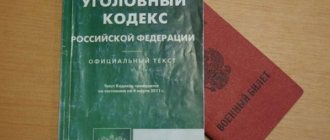A false accusation is information that does not correspond to reality and is not supported by evidence, and also alleges that a person has committed any offense. For example, accusing a person of committing murder, while knowing that he is not a criminal.
It is important to distinguish a deliberately false denunciation from an accusation. If the structure of a denunciation is based on an indication that a person has committed a criminal act, then slander can relate to any facts from a person’s life. Responsibility for a false denunciation is stricter, since its purpose is not to humiliate the honor of a citizen, but to seek to bring an innocent person to criminal or administrative liability.
Types of liability provided
How to sue for libel?
So, in order to punish the offender in court, the first thing you need to do is write a statement and demand the initiation of a criminal case. Then you will be called in for questioning. Don't forget to collect evidence against the defendant! For more information on how to prove libel in court, read this article
A false accusation constitutes a crime provided that the information disclosed does not correspond to reality (i.e. it is untrue, a lie). In this case, the guilty person acts with direct intent - he realizes that he is disseminating deliberately false information. The person who makes a false accusation is held accountable:
- Civil law . Implies payment of compensation for moral damage caused. The case is considered by the district court taking into account the factual circumstances;
- Criminal . The dissemination of knowingly false information that undermines the honor and dignity of a citizen constitutes a crime under Art. 128.1 of the Criminal Code of the Russian Federation.
Previously, administrative liability was established for libel.
If the receipt is in hand
In the case where the debtor has written a statement of extortion, and you have a receipt in your hands, the situation will be simple. You provide a document to the police or judicial authority, confirming your right to demand a specific amount of money.
If the debtor has injuries, he may falsely accuse you of causing them. Then the matter will take a different turn, because in any case it is prohibited to take physical measures, and you will have to be punished for them. An alibi will help here, another piece of evidence confirming the impossibility of developing such a scenario of events as described by the “victim.”
If there are circumstances that make it difficult to prove your own innocence and the right to claim a debt, be sure to contact an experienced lawyer. He knows all the intricacies of litigation, is well acquainted with the law, and will be able to help in a difficult situation. The specialist will also assist in filing a counterclaim or a claim for the debtor to provide knowingly false information. By drawing up a receipt, a person undertakes to repay the debt within a specific period, realizing that he will not be able to do this. There will also be a certain punishment here.
Criminal liability
To qualify libel under the Criminal Code of the Russian Federation, it will be necessary to prove that the information disseminated is untrue. Thus, you cannot open a criminal case against a citizen who claims that you have insufficient knowledge, lack moral qualities, a low degree of professionalism, etc. The accusations should not be of an evaluative nature. The following sanctions are established for false accusations under the article of the Criminal Code of the Russian Federation:
| Dissemination of information about a citizen that is deliberately false and undermines his reputation | Fine – up to 500,000 rubles. Mandatory work – up to 160 hours. |
| The above composition, committed in public speech or through the media | Fine – up to 1,000,000 rubles. Mandatory work – up to 240 hours. |
| Previously specified act involving abuse of official position | Fine – up to 2,000,000 rubles. Involvement in compulsory work – up to 320 hours. |
| Dissemination of information that: – a person has a disease that poses a danger to others; – the citizen is guilty of a crime of a sexual nature | Fine – up to 3,000,000 rubles. Mandatory work – up to 400 hours. |
| Charge of committing a criminal act of a grave or especially grave degree | Fine – up to 5,000,000 rubles. Mandatory work – up to 480 hours. |
The article for false accusation under the Code of Administrative Offenses of the Russian Federation has no legal force. However, Art. 17.9 of the Code of Administrative Offenses of the Russian Federation provides for liability for false testimony of witnesses, specialists and other participants in legal proceedings - an administrative fine of up to 5,000 rubles . We will tell you more about liability for giving false testimony here https://lexconsult.online/5786-otvetstvennost-za-dachu-zavedomo-lozhnyh-pokazanii-stati-zakona
Accusation of extortion: how real is it?
To understand what to do if the debtor accuses of extortion, let’s look at the definition of the last term. We are talking about an illegal demand for the transfer of funds, material assets, rights to property, or the commission of any actions under threat. It consists of causing bodily harm, damaging property, disseminating information that can harm a person.
Thus, in order to accuse a person of extortion, it is first necessary to provide evidence. If they are not there, the case will be lost, although it will force the other party to waste nerves and personal time on participating in the process.
Important! We must understand that extortion is a criminal offense. Therefore, when demanding money from a debtor, do it correctly and within the boundaries of acceptable methods. Do not give reasons for filing a claim of extortion, supported by evidence in the form of witness statements, audio recordings, and video materials.
Ways to avoid punishment
You can avoid criminal liability for false accusations if:
- In court, the defendant’s ignorance of the fact that he disseminated false information will be proven;
- Before the judge leaves for the deliberation room, reconciliation will take place between the parties involved in the case.
Attention! The statute of limitations for cases of liability for libel is 2 years.
Judicial practice on false accusations of the Criminal Code of the Russian Federation in the Russian Federation is just beginning to take shape, which is due to the difficulty of proving the guilt of the slanderer. Thus, in 2014, courts of general jurisdiction brought to justice only 129 people.
Lawyers achieved reclassification of the act and the release of the convicted ex-policeman
The Judicial Collegium for Criminal Cases of the Ivanovo Regional Court issued a reasoned appeal ruling dated August 10 (available to “AG”), which changed the sentence of former traffic police officer K., previously convicted of extortion and taking a bribe. The actual term of imprisonment was replaced by correctional labor, and due to the expiration of the statute of limitations for criminal prosecution, the convict was released from punishment. One of his defenders, lawyer of the Ivanovo Region Administration, managing partner of Bibik Law Firm Oleg Bibik, spoke about the peculiarities of this case.
Accusation of extortion of bribes and sentence
According to investigators, on November 4, 2021, K. and his partner stopped a car driven by citizen N., who initially did not respond to the request to stop. The police demanded documents from N. and discovered that she did not have a driver’s license. There were also two men in the car: the owner of the car, T., and his friend.
Partner K. explained to N. the essence of the administrative offense she committed under Part 2 of Art. 12.3 of the Code of Administrative Offenses of the Russian Federation and began to draw up administrative material. At this time, according to law enforcement officers, K. himself smelled the smell of alcohol coming from the inside of the car and demanded 5 thousand rubles. for failure to bring N. to justice for driving while intoxicated. In response to this, T. offered to conduct an examination of N., however, as stated in the indictment (available to “AG”), the policeman began to threaten that the examination would be carried out in such a way that N. and T. would not achieve the truth when defending their is right, he also increased the amount of the extorted bribe to 20 thousand rubles. T. agreed to hand over the money, but since he did not have it with him, the men exchanged contact information.
On November 8, the investigation indicated, K. called T., and they agreed to meet and transfer the money - immediately after receiving the banknotes, the policeman was detained by law enforcement officers as part of an operational investigation. Subsequently, K.’s actions were qualified under paragraph “b” of Part 5 of Art. 290 of the Criminal Code of the Russian Federation, a preventive measure was chosen against him in the form of a written undertaking not to leave the place and proper behavior.
During the trial in the Oktyabrsky District Court of Ivanovo, the defendant partially admitted his guilt. According to him, when he and his partner stopped T.’s car, he introduced himself as an employee of the Russian FSB, asked not to write a report to the service and began to offer a bribe, because he was afraid that his car would end up in the database of offenders. K. indicated that he took T.'s phone number in order to get to know him for advice on his career development. The accused also said that on November 8, 2021, while sitting in T.’s car, he wanted to talk to him about the necessary contacts, and he handed him money, which he regarded as “gratitude” for not writing a report to T.’s service.
In turn, T. argued in court that he gave K. exactly the bribe that he extorted so that a report on an administrative offense for drunk driving would not be drawn up against N. From N.’s testimony it followed that she was sober while driving and heard that one of the traffic police officers was extorting a bribe from her companion.
At the same time, the defendant’s partner confirmed that T. introduced himself as an FSB officer, and also indicated that K. did not tell him anything about the planned transfer of money to the latter. The accused’s colleague added that neither he nor K. suggested that N. undergo a medical examination, since she had no signs of alcohol intoxication.
The first instance was critical of the position of the accused that he had no intention to receive a bribe and regarded it as the chosen method of defense, since it was refuted, in the opinion of the court, by the collected and examined materials of the case. The court considered that the totality of both direct and indirect evidence fully confirms K.’s guilt in receiving a bribe for committing inaction in favor of the bribe-giver and the person he represents, which was part of the official powers of the official, associated with her extortion.
"TO. committed a particularly serious crime. The motive for the crime was the desire to illegally obtain funds. The crime was committed with direct intent, K., understanding the social danger of his actions, desired and achieved a criminal result, since, by receiving bribes in the form of money for the purpose of illegal, unlawful personal enrichment, he allowed harm to the interests of society and the state, undermining the authority of the public service.” , – noted in the court verdict (available from “AG”).
As a result, the court sentenced K. to 7.5 years of imprisonment in a maximum security correctional colony with a fine of 400 thousand rubles, with deprivation of the right to hold positions related to the exercise of the functions of a government representative and the performance of administrative, economic and organizational tasks. administrative functions in state authorities and local governments, for four years.
The appeal upheld the verdict
In the appeal, K.’s defense asked to reclassify the actions of the convicted person under Part 1 of Art. 290 of the Criminal Code and reduce the sentence. In particular, the lawyers noted that K.’s inaction in the form of failure to prosecute on the basis of falsified materials cannot be within the authority of an official, and therefore he could not receive a bribe for this. It was also stated that the qualifying feature “extortion of a bribe” was subject to exclusion, since it was not established that K. knowingly created such conditions under which T. was forced to transfer money to him.
However, the appeal court upheld the conviction. In its appeal ruling (available to the editors), the Judicial Collegium for Criminal Cases of the Ivanovo Regional Court considered that the conclusions about K.’s guilt were confirmed by the totality of the evidence presented in the descriptive and motivational part of the verdict and did not raise any doubts. “The arguments presented in the appeals and in the appellate court are actually aimed at re-evaluating the evidence examined; in general, they were the subject of judicial review and were not confirmed for the reasons set out in the court decision. There are no reasons to disagree with this assessment given by the trial court. The disagreement of the convicted person and the defense with the assessment of evidence given by the court of first instance is not grounds for canceling or changing the sentence,” the judicial act stated.
The second instance added that the lower court's conclusions about the guilt of the convicted person are confirmed by stable and consistent testimony of both the defendant himself and the witnesses in the case, as well as written and other evidence. “An analysis of the data available in the case materials, contrary to the arguments of the appeal, testifies to the correctness of the court’s establishment of the factual circumstances of the case, including the place, time, method, motive, the very fact of committing the crime... The arguments of the appeal that the circumstances of the case established by the court of first instance, are not confirmed by the examined evidence, the judicial panel considers them to be far-fetched and unfounded,” the appeal ruling noted.
Contents of the cassation appeal
In the cassation appeal (available to “AG”), lawyer Oleg Bibik noted that the first instance did not provide any evidence to support the conclusion about the very fact of extortion of a bribe: “The convicted K. himself denies that he expressed such threats against T. None of those interrogated by the court witnesses (including driver N.) did not confirm the threats and extortion of a bribe from K.”
“In fact, the conclusion of the court, set out in the verdict, was made not on the basis of the facts established by the court of first instance, but on the basis of conjectures and assumptions of witness T. about the nature of the extortion of a bribe in the form of a threat of falsification on the part of K. and distorts the essence of the testimony in the verdict,” - noted in the cassation appeal.
With reference to established judicial practice, the defense attorney explained: if an official does not violate the law, but simply does not take measures aimed at its implementation, and demands a bribe precisely for this, then there are no signs of extortion of a bribe. “T., if we analyze his testimony, testified that K. did not offer to give a bribe, but he “understood that the employee wanted a reward” for refusing to perform legal actions that were within his authority, during which (meaning medical examination of N.) could (presumably, but not necessarily) reveal N.’s state of intoxication, which under such conditions would entail administrative liability for N. and T., Oleg Bibik indicated. – Thus, the court did not establish signs of violation of the legitimate interests of N. and T. T. was interested in K.’s official inaction, that is, his interests had nothing to do with the law.”
The lawyer explained that K., having smelled alcohol from the inside of the car and from N.’s clothes, and seeing the drunken T., quite reasonably doubted the driver’s sobriety. “How justified these suspicions were is completely irrelevant. Even if they were wrong, he had the right to insist on a medical examination and at the same time would have acted completely within the scope of his official powers, the complaint noted. “Thus, in this case, no one put T. in conditions under which he was forced to give a bribe to K. T. had an alternative - to agree to N. undergoing a drug examination, and if the result was negative, the conflict situation would have been resolved on its own.” .
In this regard, Oleg Bibik asked the court of cassation to reclassify the act as less serious and reduce the sentence for the convicted person.
The cassation considered that the appeal ignored the defense arguments
The Second Cassation Court of General Jurisdiction partially upheld the defense lawyer's cassation appeal, canceling the appeal ruling and returning the criminal case for a new appeal hearing.
The cassation noted that the court of appeal, motivating its conclusions regarding the type of punishment to be imposed on K., pointed to the high degree of social danger of the crime committed. At the same time, the verdict does not provide specific factual circumstances to support this conclusion. “The focus of the act on interests protected by law, social values and the harm caused by it, which the court pointed out, must be taken into account when assessing the nature of the public danger of the crime, defined by criminal law and depending on the elements of the crime established by the court,” the cassation ruling noted.
The panel of judges added that the verdict contains contradictory judgments regarding the imposition of a fine on K.: first it is stated that it will not correspond to the legitimate goals and objectives of the punishment, then - that the correction of the convicted person and the restoration of social justice will be possible subject to the imposition of a fine. “Taking into account the absence in the verdict of a proper assessment of the degree of social danger of the crime committed, the inconsistency of the court’s conclusions regarding the type of punishment, the court’s conclusion that the provisions of Art. 64 of the Criminal Code of the Russian Federation, since such a conclusion is made only on the basis of the court’s assessment of the presence or absence of circumstances that significantly reduce the degree of public danger of the crime,” the cassation emphasized.
The Court of Cassation also noted that the appeal did not properly consider the arguments of K. and his defense about the injustice of the imposed punishment, formally referred to the provisions of the criminal law without checking their compliance by the first court, and ignored the contradictions in the verdict. “Moreover, the court of second instance either established other circumstances of the case that were not imputed to K., namely, the convict making threats to V., or was negligent by repeatedly confusing witnesses V. and T., which in any case is unacceptable for the appellate court “, - stated in the judicial act of cassation.
Upon retrial, the convict was released from liability
When re-examining the criminal case, the Judicial Collegium for Criminal Cases of the Ivanovo Regional Court found that the conclusions of the first instance about the proof of K.’s guilt in illegally receiving money from T. are correct, correspond to the factual circumstances of the case and are based on the totality of those examined at the court hearing and presented in verdict of evidence. The court also found it established that K. received a bribe from T.
At the same time, the appeal emphasized, the conclusions about K. receiving a bribe associated with her extortion were based by the court of first instance on the testimony of witness T. about the convict uttering a threat to falsify the material in the case of an administrative offense, which would entail the unconditional involvement of T. and N to administrative liability, which was regarded by him as a violation of his legal rights. “However, the testimony of witness T. in this part is not consistent and stable. At the same time, according to the protocol of the court session, at the request of the defense, the testimony of witness T., given during the preliminary investigation during a confrontation with K., was read out, from the content of which it follows that K. did not commit any actions aimed at extorting a bribe.” , the appeal indicated.
It was also noted that, at the request of the defense, the testimony of witness T. was read out, given already at the court hearing during the consideration of the case by the Oktyabrsky District Court of Ivanovo in the period from August 20 to November 25, 2021, in which he actually confirmed the previously given testimony, and also confidently reported the absence of any influence on him from law enforcement officers, as well as other persons. “The court of first instance, when making the appealed decision, did not provide the testimony of witness T. in the verdict, read out at the request of the defense, did not give a legal assessment of this evidence, which is essential for the correct qualification of the actions of the convicted person, nor did it indicate the reasons why they were rejected by the court,” noted in the appeal ruling.
The appeal added that from the factual circumstances of the accusation it follows that K. received a bribe for legal inaction, expressed in the failure to bring T. and N. to administrative responsibility. “The court did not take into account that K.’s official powers as a traffic police inspector included the preparation of materials on bringing persons to administrative responsibility if there were grounds for its occurrence. The threats expressed by K. to undergo a medical examination in the event of failure to comply with his demands for the transfer of a bribe did not affect the legally protected interests of T. and N., but would have been carried out within the framework of K.’s official powers,” the regional court noted.
Thus, the appeal changed the sentence against K., reclassifying his actions from paragraph “b” of Part 5 of Art. 290 of the Criminal Code of the Russian Federation on part 1 of the same article, according to which a punishment was imposed in the form of correctional labor for a period of 1.5 years with the withholding of 10% of earnings to the state income, with deprivation of the right to hold positions related to the exercise of the functions of a representative of government and the performance of administrative duties. economic and organizational and administrative functions in state authorities and local governments, for a period of 2.5 years. At the same time, due to the expiration of the statute of limitations for criminal prosecution for this crime, K. was released from serving his sentence.
Defender's comment
In a commentary to AG, Oleg Bibik said that when building a line of defense there was no need to “spray too thin” and prove a lot of facts, instead it was necessary to focus on the most important thing - namely the absence of extortion, which made it possible to achieve retraining. “I also liked the conclusions of the cassation court because in fact this instance voiced the following message: “you need to listen to lawyers, why didn’t the appeal respond to the defense’s arguments?” At the same time, the cassation noted that the severity of the imposed punishment was also reflected in the fact that in itself bringing to justice for a particularly serious crime is not enough to impose such a severe punishment; for this, a number of other circumstances must be taken into account. As a result, in the second round, the appeal heard the same arguments from the defense and made the right decision,” he noted.
The editors of “AG” were unable to promptly obtain a comment from K.’s second defender, lawyer of the Ivanovo Region Administration Irina Mosina.
Self-incrimination
Importantly, falsely accusing yourself is also a criminal offence. The condition for bringing to responsibility is that self-incrimination has confused or could have confused the consideration of the case and misled the court.
Punishment for a citizen will be determined for a false denunciation (for example, a person confesses to a crime that he did not commit) or for giving false testimony (for example, when providing incorrect information during interrogation in a courtroom).
A specialist will answer your questions in the comments to the article
How to spot a false accusation
The law says that only an accusation made by a person who is sure that he is telling a lie can be called false. Then this crime is qualified as a knowingly false accusation.
A false accusation and a false denunciation must be distinguished. They differ in the following features:
- a false accusation concerns any facts from a person’s life that can cast a shadow on him, and a false denunciation can only occur in relation to a crime committed;
- in the case of a false accusation, untrue and defamatory facts can be reported both to ordinary citizens and to persons occupying certain positions, and when a false denunciation occurs, all information is intended only for authorities that can initiate criminal proceedings;
- a false accusation does not serve the purpose of subjecting a person to trial, unlike denunciation, which implies bringing an innocent citizen to justice.







